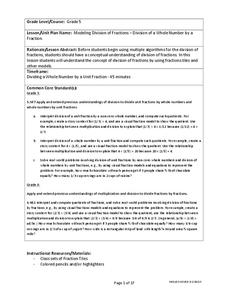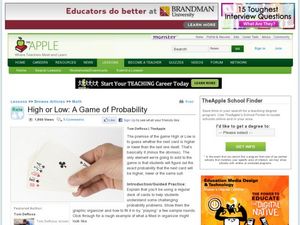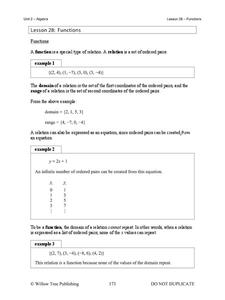Blogger
Order of Operations Foldable and Graphic Organizer
A 2-for-1 printable that includes a graphic organizer and foldable activity practicing the order of operations. Print out the hopscotch organizer that stacks multiplication with division and addition with subtraction so learners remember...
Curated OER
Multiple Use Flower Power Graphic Organizer
In this multiple use flower power graphic organizer worksheet, students use a flower shaped black line picture in a number of ways. They put a picture in the middle circle and place describing words in the petals. They place a prefix or...
EngageNY
More Examples of Functions
Discrete or not discrete? Individuals learn about the difference between discrete and non-discrete functions in the fourth installment of a 12-part module. They classify some examples of functions as being either discrete or non-discrete.
Intensive Intervention
Fractions as Numbers
Your learners will enjoy thoroughly understanding fractions, and you will appreciate the abundant, quality resources in this comprehensive unit that builds toward a complete understanding of the concept of fractions as numbers. Many...
West Contra Costa Unified School District
Modeling Division of Fractions
Introduce young mathematicians to the process of dividing fractions with a hands-on math lesson. Using the help of fraction strips and other visual models, children work through a series of example problems as they...
Charleston School District
Solving Systems by Inspection
Can you solve a system by just looking at it? The previous lessons in the series taught three methods of solving systems of equations. Now learners discover they can determine the number of solutions of a system just by looking at it....
Charleston School District
Solving Systems Graphically
When guess and check gets old, it's time to start graphing! An instructive lesson explains how to solve a system of linear equations using graphing. Equations are in both slope-intercepts and standard form.
West Contra Costa Unified School District
Solving Radical Equations
How can you make solving radical equations more engaging? Provide your math class with a hands-on activity that focuses on solving radical equations with flash cards. A warm-up and exit ticket flank direct instruction of the steps...
Curated OER
High or Low- Probability
Young scholars use playing cards to examine probability. In this probability lesson, students work in groups with a deck of cards and predict if the next card they lay down will be high or low. Young scholars fill out a graphic organizer...
Virginia Department of Education
Radical Equations
Provide students with the skill for how to examine algebraic and graphical approaches to solving radical equations. Learners solve various radical equations involving square root and cube root expressions. They first solve...
Charleston School District
Identifying Irrational Numbers
These numbers have some personality! Are they rational or irrational? The lesson examines the definitions of rational and irrational numbers and shows examples of how to identify them.
Willow Tree
Solving Quadratic Equations
Polynomials are full of solutions! Learners understand that the degree determines the number of solutions. Examples show quadratic equations solved by factoring and by using the quadratic formula. A cubic equation is even mixed in for...
EngageNY
Applications of Congruence in Terms of Rigid Motions
Corresponding parts, congruent parts, congruent corresponding parts—what does it all mean? The resource challenges pupils to identify corresponding parts for pairs of figures. It uses examples of figures that undergo rigid...
EngageNY
Numbers Raised to the Zeroth Power
What in the world is the zeroth power? Examine the patterns of exponents as they apply to the zeroth power. Scholars apply the zero property to simple exponential expressions in this fourth lesson in a series of 15. The examples include...
Willow Tree
Order of Operations
It's the classic please excuse my dear aunt sally strategy to remembering the order of operations. Young mathematicians practice to develop an understanding of the order of operations. Examples and practice problems include...
Blogger
The Real Number System
Classify numbers into their groups with this graphic organizer for the real number system. The printable provides a space for all the categories, with a separate column for unreal numbers.
CK-12 Foundation
Multiplying Polynomials
Help your class find patterns in polynomial multiplication. Pupils multiply a trinomial by a binomial using a graphic organizer. They respond to questions about patterns observed in polynomial multiplication before a discussion question...
Flipped Math
Calculus AB/BC - Derivatives of cos(x), sin(x), e^x, and ln(x)
The shortcuts are not just for polynomial functions. Pupils learn the derivatives of the two basic trigonometric functions, cosine and sine. The video provides the derivatives for exponential and logarithmic functions. Learners work...
West Contra Costa Unified School District
Matching Quadratic Functions
Ever sigh when learners ask why they have to know so many different forms of the quadratic equation? Here is a lesson that comes in handy! Using hands-on matching activities, quadratic equations are explored through...
Willow Tree
Transformations
How does something go from here to there? Describe it with a transformation. Young mathematicians learn how to translate, reflect, rotate, and dilate an image.
Charleston School District
Solving Equations by Combining Like Terms
How do you make these x's get along? Building on the previous lesson in the series, learners solve equations by combining like terms. The video uses objects to help pupils understand the concept.
K20 Learn
What Is It to Be Financially Literate?
What does it mean to be financially responsible? Develop a working definition of financial literacy with your classes. Using six scenarios, learners debate financially literate actions and develop a definition based on their decisions.
Willow Tree
Functions
What makes a function a function? Learn the criteria for a relation defined as a function both numerically and graphically. Once young mathematicians define a function, they use function notation to evaluate it.
Curated OER
Writing Takes Shape!
Students read The Greedy Triangle and discuss geometric solids. In this geometry lesson, students list the geo-solids in the world and create a graphic organizer to show where geo-solids exist.























